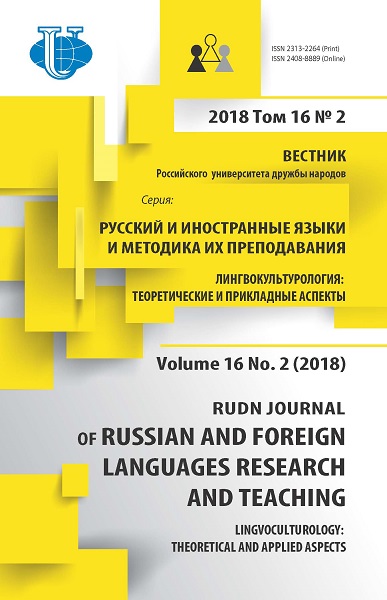Linguistic conceptualization of pride in Russian and English cultures
- Authors: Karasik V.I.1
-
Affiliations:
- Volgograd State Socio-Pedagogical University
- Issue: Vol 16, No 2 (2018): LINGVOCULTUROLOGY: THEORETICAL AND APPLIED ASPECTS
- Pages: 157-171
- Section: Cultural Linguistics: Theoretical and Applied Aspects
- URL: https://journals.rudn.ru/russian-language-studies/article/view/18555
- DOI: https://doi.org/10.22363/2313-2264-2018-16-2-157-171
- ID: 18555
Cite item
Full Text
Abstract
The paper deals with linguistic conceptualization of pride in Russian and English. Main notional vectors of such mental entity are specified. This concept is represented as a semantic field of affiliated meanings defining various aspects of personal social status evaluation. I argue that exaggerated selfrepresentation is expressed as contempt to the others, desire to dominate and show disrespect to other people, and to show them that they belong to a lower class. This concept is often illustrated by metaphors of size and height. Common ways of nonverbal demonstration of pride are certain facial expressions and gestures. Typical objects of feeling proud of are described. Everyday and religious discourse substantially varies in expression and evaluation of pride. Proverbs focus on critical evaluation of being too proud of oneself, whereas aphorisms show an ambivalent attitude to this concept.
Keywords
About the authors
Vladimir Ilyich Karasik
Volgograd State Socio-Pedagogical University
Author for correspondence.
Email: vkarasik@yandex.ru
Doctor of Philology, Professor and Chair, English Philology Department, Volgograd State Socio-Pedagogical University. Research interests: lingvokulturologiya, lingvokontseptologiya, theory of discourse, theory of language personality. Author of about 400 scientific publications, 12 of them are monographs
27, Prospekt Lenina, Volgograd, 400066, Russian FederationReferences
- Abramov, N. (1999). Dictionary of Russian synonyms and similar in meaning expressions. Moscow: Russian dictionaries Publ. (In Russ).
- Aleksandrova, Z.E. (1969). Dictionary of synonyms of the Russian language. Moscow: Sov. Encyclopedia Publ. (In Russ).
- Vezhbitskaya, A. (1999). Semanticheskie universalii i opisanie yazykov [Semantic universals and description of languages]. Moscow: School “Languages of Russian Culture” Publ. (In Russ).
- Vorkachev, S.G. (2001). Lingvokul’turologiya, yazykovaya lichnost’, kontsept: stanovlenie antropotsentricheskoi paradigmy v yazykoznanii. Filologicheskie nauki [Cultural linguistics, language personality, the concept: the formation of the anthropocentric paradigm in linguistics. Philological sciences]. 1, 64—72. (In Russ).
- Vorkachev, S.G. (2007). Napolnenie kontseptosfery. Lingvokul’turnyi kon-tsept: tipologiya i oblasti bytovaniya [Filling the conceptosphere. Linguocultural concept: typology and domains of existence]. Volgograd: VolGU Publ. (In Russ).
- Dal’, V.I. (1996). Proverbs of the Russian people. Moscow: TERRA Publ. (In Russ).
- Dem’yankov, V.Z. (2001). Ponyatie i kontsept v hudozhestvennoi literature i nauchnom yazyke. Voprosy filologii [Idea and concept in fiction and scientific language. Questions of philology]. 1, 35—47. (In Russ).
- Evgen’eva, A.P. (2001). Slovar’ sinonimov russkogo yazyka [Dictionary of synonyms of the Russian language]. Moscow: Astrel’—AST Publ. (In Russ).
- Karasik, V.I. (2002). Yazyk sotsial’nogo statusa [Language of social status]. Moscow: Gnozis Publ. (In Russ).
- Karasik, V.I. (2004). Yazykovoi krug: lichnost’, kontsepty, diskurs [Language Circle: personality, concepts, discourse]. Moscow: Gnozis Publ. (In Russ).
- Koshmanova, O.V. (2007). Kontsept «skromnost’» v russkoi, amerikanskoi i iranskoi lingvokul’turakh [The concept of “modesty” in Russian, American and Iranian linguocultures]. [Author’s abstr. cand. filol. diss.]. Volgograd. (In Russ).
- Krasavskii, N.A. (2008). Emocional’nye kontsepty v nemetskoi i russkoi lingvokul’turakh [Emotional concepts in German and Russian linguocultures]. Moscow: Gnozis Publ. (In Russ).
- Kuznetsov, S.A. (1998). Great Dictionary of Russian language. Saint Petersburg: Norint Publ. (In Russ).
- Mushaeva, O.K. (2008). Prezentatsionnye regulyativnye kontsepty v kalmytskoi, russkoi i angliiskoi lingvokul’turakh [Presentation regulative concepts in Kalmyk, Russian and English linguocultures]. [Author’s abstr. cand. filol. diss.]. Volgograd. (In Russ).
- Natsional’nyi korpus russkogo yazyka [National building of the Russian language]. Retrieved January 19, 2018. from: www.ruscorpora.ru
- Permyakov, G.L. (2001). Poslovitsy i pogovorki narodov Vostoka [Proverbs and sayings of the peoples of the East]. Moscow: Labirint Publ. (In Russ).
- Pimenova, M.V. (2004). Dusha i dukh: osobennosti kontseptualizatsii [Soul and spirit: features of conceptualization]. Kemerovo: Grafika Publ. (In Russ).
- Slyshkin, G.G. (2004). Lingvokul’turnye kontsepty i metakontsepty [Linguistic Culture Concepts and Metaconcepts]. Volgograd: Peremena Publ. (In Russ).
- Stepanov, Yu.S. (1997). Konstanty. Slovar’ russkoi kul’tury. Opyt issledo-vaniya [Constants. Dictionary of Russian culture. Experience of research]. Moscow: Shkola «Yazyki russkoi kul’tury» Publ. (In Russ).
- Sternin, I.A. (2008). Opisanie kontsepta v lingvokontseptologii. Lingvo-kontseptologiya [Description of the concept in linguo-conceptology. Cultural linguistics]. Voronezh: Istoki Publ. 1, 8—20. (In Russ).
- Chernykh, P.Ya. (1999). Istoriko-ehtimologicheskii slovar’ sovremennogo russkogo yazyka [Historical and etymological dictionary of the modern Russian language]. Moscow: Russkii yazik Publ. (In Russ).
- Klein, E. (1966). A Comprehensive Etymological Dictionary of the English Language. Amsterdam: Elsevier.
- Longman Dictionary of Contemporary English. Harlow and London, 1978.
- The British National Corpus (BNC) Retrieved January 22, 2018. from: www.natcorp.ox.ac.uk Laird, C.G. (1971). Webster’s New World Thesaurus. New York: Meridian.
Supplementary files














